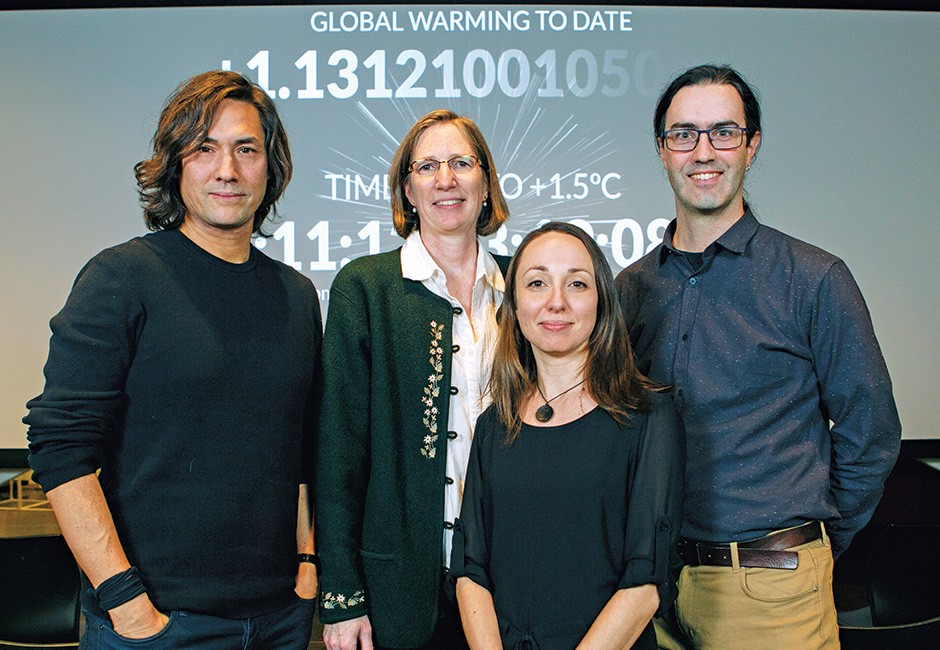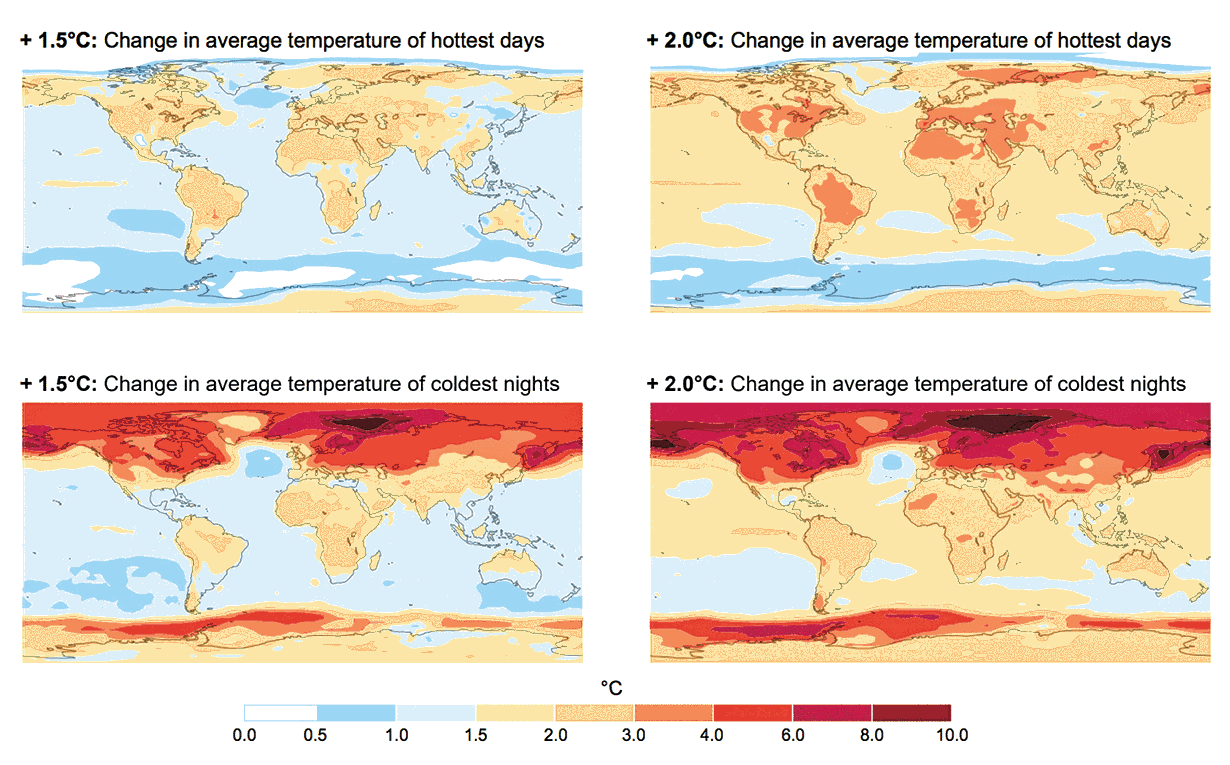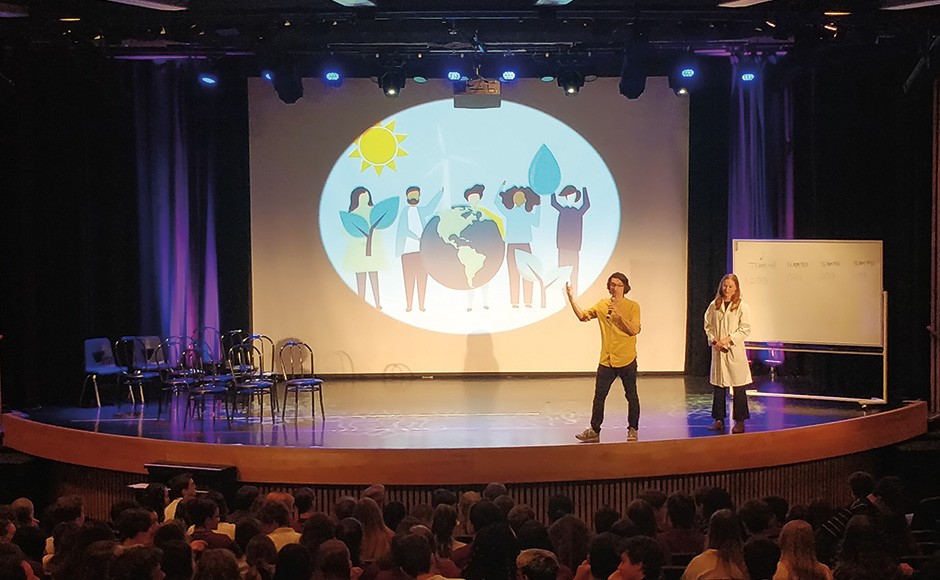Climate of hope
 Damon Matthews (right) at the Climate Clock Update with musician David Usher; Pascale Biron, chair of the Department of Geography, Planning and Environment; and Assistant Journalism Professor Amélie Daoust-Boisvert.
Damon Matthews (right) at the Climate Clock Update with musician David Usher; Pascale Biron, chair of the Department of Geography, Planning and Environment; and Assistant Journalism Professor Amélie Daoust-Boisvert.
When Damon Matthews, a professor in Concordia’s Department of Geography, Planning and Environment, reset his climate clock last December, it put a global crisis in stark relief.
Created in 2015 by Matthews and musician/activist David Usher, the climate clock visually tracks and displays the planet’s rise in temperature in real time. It uses the latest rate of carbon dioxide emissions and level of humanproduced temperature rise to track how long we have until the Paris Agreement’s limits expire.
The agreement’s long-term objective is to restrict the global average temperature to below 2C above pre-industrial levels and, in order to reduce the perils of climate change, to limit the rise to 1.5°C. The current level already sits at 1.13°C and is projected to reach 1.5°C by November 2032.
“With this latest update, we lost two years on the timeline,” says Matthews. “This is actually the biggest change since we started.”
‘We need a major mind shift’
Researchers in Concordia’s Department of Geography, Planning and Environment are more aware than most of the risks of climate change. Matthews is the Concordia University Research Chair for Climate Science and Sustainability; he studies climate change and carbon emissions, and uses computer modelling to track and foresee global warming patterns. “Climate change is real, it’s happening and it’s mostly our fault,” he says. “It’s time that we do something about it.”
His departmental colleague Jochen Jaeger agrees. Jaeger is co-director of the Loyola Sustainability Research Centre; he studies a range of subjects including landscape ecology, road ecology and urban sprawl. “Ultimately, to change our lifestyle and consume less, we must reduce our CO2 emissions by so much — beyond 50 per cent, down to 5 or 10 per cent,” he says. “That needs a major mind shift.”
So Jaeger and his fellow researchers have banded together to take action.
 Projected temperature changes with 1.5°C and 2°C of global warming, compared to pre-industrial levels.
Projected temperature changes with 1.5°C and 2°C of global warming, compared to pre-industrial levels.
Last year, faculty and students formed a Climate Emergency Committee, spearheaded by Jaeger. The committee’s first act was to officially declare a climate emergency. (Concordia also joined other universities and colleges in signing a global climate emergency letter in advance of the United Nations COP25 climate conference in Madrid last December.)
The Concordia committee’s objectives are to increase awareness in Quebec of the climate crisis, help people reduce their environmental impact and develop constructive departmental policies.
One of those policies, unanimously adopted by the department, is a pledge to cut back on a significant producer of greenhouse gas emissions — air travel. Jaeger hopes to see other academics follow suit in choosing more environmentally responsible modes of transport, or in forgoing travel altogether by remotely delivering conference presentations.
One solution? Education
The Climate Emergency Committee also wants to support high schools in teaching the basic facts of climate science.
Compared with medical science, climate science is underfunded and inaccessible to the general public, Jaeger says. “Everybody is sick in their lives at some point and they know medical doctors are important. I think there are a lot of parallels between taking care of the planet and taking care of your own health.”
His conclusion? “Education will be the major, if not the most important, force for future generations. There are certain facts people should be aware of. Otherwise you just don’t understand the severity of this whole thing.”
With that in mind, the Climate Emergency Committee reached out to high schools, CEGEPs and school boards across Quebec to help integrate climate science into curricula.
Two leaders of the educational outreach are grad students Alexandre Pace and Claire O’Neill Sanger.
Pace is a master’s candidate who uses tree-ring analysis to research the climate of the Gaspé Peninsula. He spent dozens of hours with other students developing “Climate Geopardy” — a game loosely based on Jeopardy that was proposed by the committee as a fun way to absorb serious material.
“So far every teacher has loved it,” says Pace. “They tell me they’ve never seen students so engaged.” Last fall, he visited a total of 19 classrooms in high schools, CEGEPs and at Concordia.
Once “Climate Geopardy” has been further refined, the committee wants to translate it into French, and produce an online and booklet version. As outreach coordinator, O’Neill Sanger is working on a funding strategy. O’Neill Sanger is also a master’s student; she uses pollen records to investigate the effects of European colonization and anthropogenic climate change on sugar maple forests in Southern Quebec.
 Grad students Alexandre Pace and Claire O’Neill Sange developed “Climate Geopardy” — a game loosely based on Jeopardy as a fun way to absorb serious material.
Grad students Alexandre Pace and Claire O’Neill Sange developed “Climate Geopardy” — a game loosely based on Jeopardy as a fun way to absorb serious material.
The impact of climate change became vividly clear to her a few summers ago, while she was planting trees in British Columbia. Hot, dry weather led to raging fires that devastated land just recently replanted and surrounding towns had to be evacuated. When she left her camp for the season, the sight of flames on either side of the road stayed with her. O’Neill Sanger finds her collaborative work on the committee empowering. She also draws inspiration from her grandmother, who spoke out against local radiation contamination in Port Hope, Ont.
“I learned from her that you can’t wait for others to lead the change you want to see.”
In a similar vein, Pace wraps up his class visits with an optimistic and practical focus on solutions. Because Montreal may not be as badly affected by climate change as other parts of the world, he observes, it presents an opportunity: “We’re in a good position to help.”
Pace encourages the young people in his outreach classes to attend community gatherings and apply pressure on government representatives — and also reminds them that individual actions matter.
“About a quarter of a person’s overall contribution to emissions comes from the things we buy, mostly clothing and electronics. So one of the best decisions we can make is to consume less and buy durable, quality goods.”
The importance of hope
Damon Matthews says he sometimes wonders how we can solve the climate crisis when it seems like an insurmountable challenge just to get his three youngest children out the door in the morning.
But he notes that climate change was a significant issue in the last Canadian federal election and is high on the agenda of the United Nations, which released an influential report in 2018 by the Intergovernmental Panel on Climate Change.
Plus, the crisis has become difficult to ignore, given recent developments — from the bushfires in Australia and record highs in ocean temperature to the prominent activism of Greta Thunberg and student protesters around the world.
And despite the absence of a concerted global effort, there is evidence of progress, Matthews says. If renewable resources and institutional capacity are properly harnessed, changes could rapidly occur. “The point,” says Matthews, “is to find some way of taking action and contributing to the solutions.”
His colleague Jaeger is quick to stress the benefit of this approach. He quotes a line from The Song of the Dodo, the influential 1996 book by American science writer David Quammen:
“The unsatisfactory thing about despair, in my view, is that besides being fruitless, it’s far less exciting than hope.”